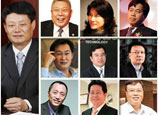
Asia Pacific remains one of the most exciting wealth management markets globally. Driving this is China's important high-net worth, or HNW, market, contributing to over 50 percent of the growth in the region, excluding Japan, by 2015.
HNW wealth in China's first-tier cities represents about 20 percent of China's HNW wealth, while in second-tier cities it represents more than 30 percent. Although offshore investments are becoming more popular, main investment activities are still carried out onshore in China.
This is consistent with our observation that 90 percent of wealth in the Asia-Pacific resides in the domestic markets.
Coupled with the restrictions imposed by cross-border regulations, the new wave of growth will inevitably focus on the domestic business. Hence, UBS' strategy in the region is to expand our international business in Singapore and Hong Kong, and invest further in organic growth in domestic businesses in China, Japan, Hong Kong, Singapore, Australia and Taiwan.
New business
China, in particular, represents one of the most important sources of new business opportunities for UBS across our businesses anywhere in the world. UBS' domestic wealth management services are offered via a dual platform, which best positions us to respond to changes in the regulatory environment and to deliver a full range of products and services to our clients.
If we were to examine the general profile, a large majority of our clients from China, like the rest of Asia, tend to be successful private entrepreneurs in their first or second generation of wealth who are still in wealth creation or wealth accumulation mode.
Generally, they tend to have relatively higher risk appetites compared with HNWI in Europe, are keen to put their assets to work and are very open to taking a more active role in their investments, both in terms of the selection and management of their investments. This frequently translates into the desire to reinvest in their business or in a familiar industry related to their business, where they feel they can make much higher returns.
In such situations, we often caution clients about the dangers of concentration risk where a wrong call could have severe implications for both the business and family wealth.
Recent global economic crises, such as the financial crisis and the European debt crisis, have led to a growing realization among Chinese clients that China's economy is no longer decoupled from the global economy.
With the low interest rate environment, rising inflation in Asia and the debasing of currencies by central banks via quantitative easing, we have seen Chinese clients increasingly keen to participate in global investment opportunities to diversify risks and maximize returns.
While traditional asset classes such as equities, bonds, mutual funds and real estate continue to form the majority of their portfolios, we are also seeing growing interest in alternative investments such as hedge funds, private equity, commodities, and innovative structured products.
Given that many of our Chinese entrepreneur clients are still actively involved in their businesses, the question of how to grow their businesses, whether through debt or capital market activities or M&A, remains a top consideration.
Their requirements can range from raising capital for business expansion to listing the company to buying or selling companies. Hence, what Chinese clients are looking for is an integrated platform with global reach which allows them to draw on the combined expertise of specialists from wealth management, investment bank and global asset management to work with them on their investment, corporate and family wealth needs.
On the family front, it is never too early to start thinking about succession management to ensure that wealth and control of the family business is properly placed into the hands of the next generation. Like the rest of Asia, this is a very important topic for our Chinese clients. Until recently, succession planning was often focused on putting in place an asset holding structure such as a trust to achieve asset protection and pass on wealth to the next generation for the purposes of a transition between two generations. However, increasingly we have observed that successful entrepreneurial families in Asia, including those in China, want to plan for the very long term, sometimes for perpetuity, leaving a true legacy. In that sense the transition is not only about asset succession or business succession from one generation to the next but about values succession.

















 Rainstorms flood more than 10,000 cars in underground garages in Wuhan
Rainstorms flood more than 10,000 cars in underground garages in Wuhan


![]()
